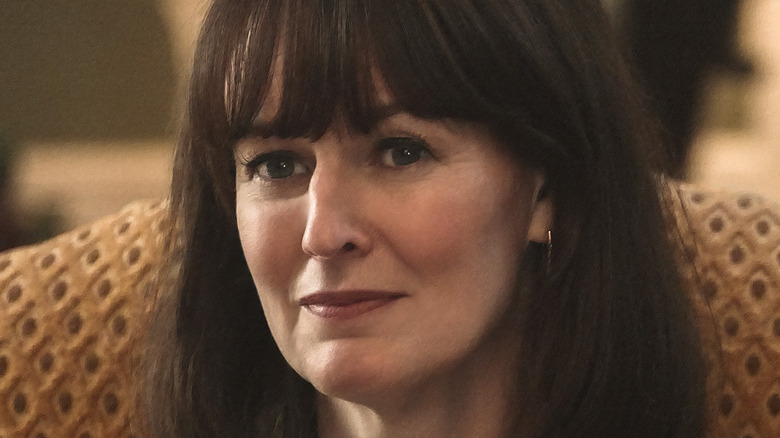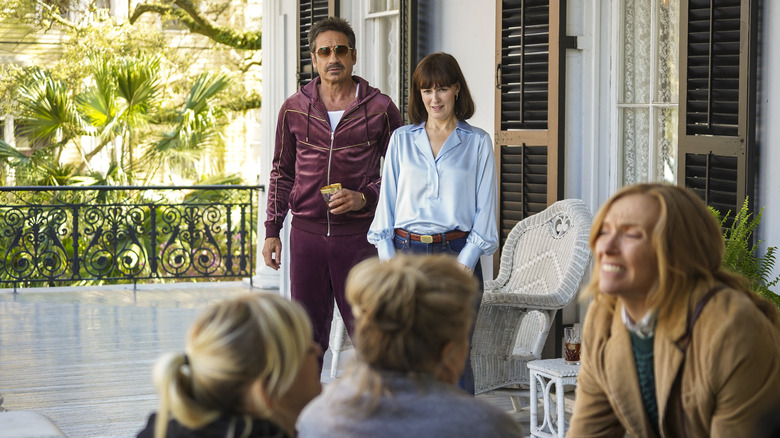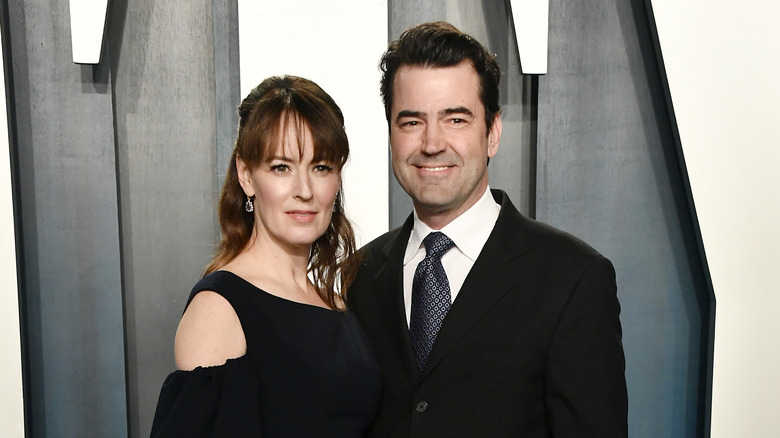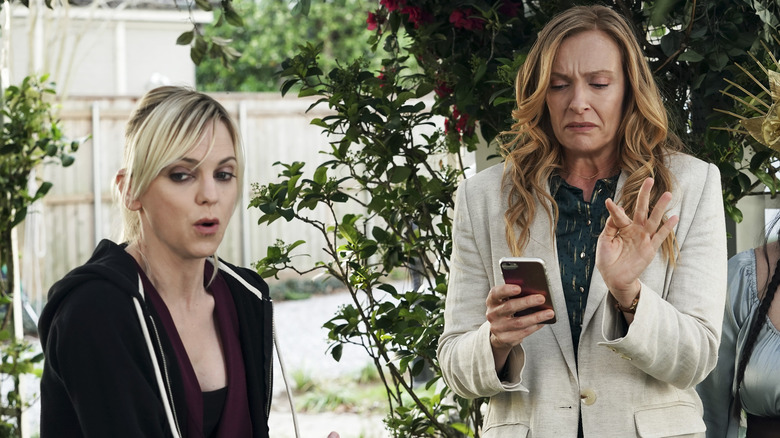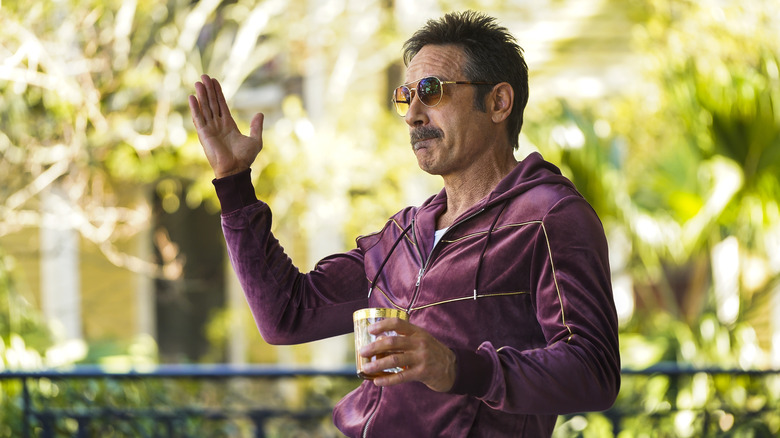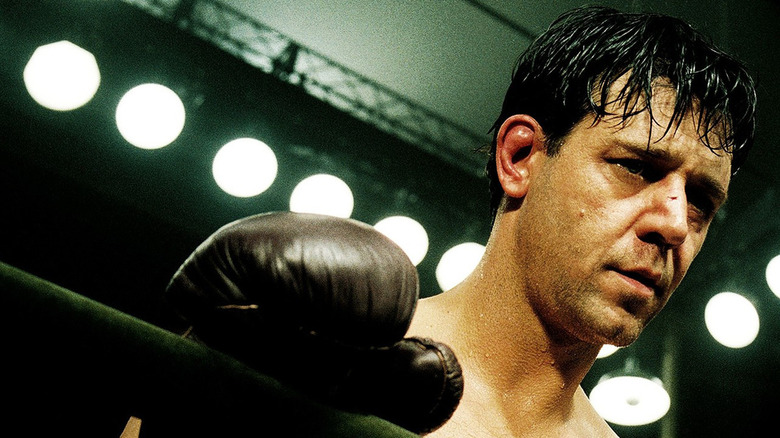The Estate's Rosemarie DeWitt On Working With Toni Collette, David Duchovny, And Her Husband - Exclusive Interview
Money — or the promise of it — will drive people to do some insanely wrong-headed things, especially when their backs are against the wall and the bills are piling up. That's the premise of writer-director Dean Craig's "The Estate," in which sisters Macey (Toni Collette) and Savanna (Anna Faris), struggling to hold onto the New Orleans café that their late father established, concoct a get-rich plan so crazy that it just might work. Or not.
They intend to charm their way back into the good graces of their estranged, very wealthy aunt Hilda (Kathleen Turner), who's not long for this world but still has enough strength to write her suddenly kind-hearted nieces into her will. But first, they have to contend with their tightly-wound cousin Beatrice (Rosemarie DeWitt) — who drags her downtrodden husband James (Ron Livingston) along for the ride — as well as their creepy cousin Richard (David Duchovny), who has no filter at all and some decidedly sketchy ideas about how cousins are supposed to get along.
All four cousins, plus James and some others who get caught up in this increasingly toxic storm of irrational behavior, go to inappropriate lengths to secure their place at the top of Aunt Hilda's list of favorites. That makes "The Estate" a combination of slamming-door farce and nasty black comedy that will often leave you wondering just how far this group of dysfunctional family members will go.
For Rosemarie DeWitt, the chance to play the manipulative, domineering Beatrice was not just a chance to act alongside her real-life husband, Ron Livingston, but also an opportunity to let her id out on camera for a little while. "It's really fun to do," she told Looper in our exclusive interview, although she also cautioned, "I wouldn't recommend it as a way to live."
How Rosemarie DeWitt approached her character
These characters are so loopy, inappropriate, and obsessive in their own way. What did you latch onto for Beatrice, and how did you get inside her head?
I feel like I latched on to how many repressed wants I have and ... Maybe it's not all women. I'm sure it's not all women, but it's me — especially when you're in a specific chapter in your life that is called motherhood, where you put everybody's wants and needs ahead of your own. I was like, "What would it be like if every thought and impulse I had was for myself and what I wanted?" I let myself inhabit that with no apologies, no considering anyone else's feelings. It's really fun to do. I wouldn't recommend it as a way to live.
But liberating in front of the camera.
For sure.
Did you and Ron [Livingston] come into it together, or did somebody suggest it might be fun to cast it this way?
These days, it's always hard. So many things shoot outside of LA, so a parent is always leaving their kids. The best way to get one of us to go work is to cast the other one too, so it becomes a whole family affair. That's actually happened a couple of times, which has been very lucky. A lot of times, weirdly, it's been my job that I got, and then someone's like, "Oh, Ron's going to be here. Would he ever want to play such and such?"
Toni Collette is a friend and a person I've had the privilege of working with a couple times now, and she said, "Would you want to do this?" Then she was like, "Do you think Ron would want to do it?" I was surprised. I think he has an ego about the kinds of roles he plays, but not when it comes to me. He wanted to support me being Beatrice. Then I was like, "Don't ever do that again. I'm so mean to you. That's so awful. It's so emasculating." But it was really fun to work together.
Real-life marriage vs. dysfunctional screen marriage
Now, I'm guessing your relationship isn't as toxic as this one is. But are there some fundamental truths about any marriage that you can tap into playing these roles together?
What I related to, and I don't even know if it stayed in the movie, but ... There was a beat that was always hard to pull off where it was a big, "Shut the f up," which a lot of people want to say to their partner sometimes. But there was a take we did of something where ... in the middle of a take, I did an improv where I was like, "James, can you leave the room? You're stressing me out." It was a feeling of wanting to control your partner. You have to resist the impulse to change people. You can't change people, but when you've been in deep partnership for a long time, you would love to tell them exactly what to do. That part felt true.
That goes back to what you're saying about playing this character and being able to do these things on set that you don't necessarily do in real life.
You would never want to. You might have that impulse, but to see the look on their face when they're like, "Really? You're going to talk to me like that?," would be terrible. It is fun to do it where you do it, and then you get applause for it. David Duchovny, the worse he got, the harder we laughed.
Is it harder to leave work at the office and not talk about it after hours when you're working together and playing a married couple?
No. It's so easy. When I was young ... When you're a young actor, the work is so front and center, and it's not just the work itself. It's wanting to be good, not wanting to mess it up. Now it's the joy of having somebody you trust so much ... [for example], I would never start making out with somebody in a scene to get what I want. But with Ron, it can be scripted and I can have that impulse, and I don't need to ask for permission or whatever, because I know he is going to go with it.
If anything, it wasn't like we didn't leave work at home. We were more pinching ourselves being like, "We're so lucky that we get to do this, and we're lucky that we get to do it together." That's a great way to spend a day. It was fun because our kids actually got to come to set and watch us — not for the inappropriate stuff — and I could tell that they thought it was cool too.
Why Rosemarie DeWitt loves working with Toni Collette
This is the third time you and Toni Collette have worked together. What's it like for the two of you to collaborate at this point? Is it a natural rhythm that you play off each other, even though you've been in very, very different projects together?
Yes and yes. In "The Staircase," I was nervous because sometimes I would hear her talk, and I started to go back into the TV show we did together. It just pulled me. That's the only hazard to it. But she's one of my favorite actors to work with, period, because she's so brave and free. She has so much fun when she works ... It's always instant. It's like we've been playing tennis together for 400 years. I hope three isn't the number we stop at. I hope I can work with her at least three more times or 30.
A lot of actors have told me that in films or TV series, you get a group of people who come together very intensely for a short period of time, and you bond. Then at the end, everybody's like, "We'll stay in touch," but it doesn't always happen that way. Do you find that you've managed to stay friends with Toni and maybe other people along the way?
It depends who you are and where you're at in your life. [Toni] lives on a different continent ... [but] sometimes you go away, but then you're back in, and you know you're not going to slip in and out.
There's also a reason why sometimes the relationships go [away] — it's because you can't have that many relationships. There's 300 people on a movie set, and there's so much trust that has to be built, not just among the actors or creatives, but from maybe the guy who built the harness that's suspending you. You become intimate with each other. It's quite honestly too many people. You can't be intimate with that many people in real life.
Getting to work with David Duchovny and Kathleen Turner
You mentioned David Duchovny before. I'm going to ask this question in the most affectionate way possible, having admired him for a long time: Is he as out of his mind off camera as he appears on camera in this movie?
No, he's not — well, out of his mind, meaning he's in his mind. He's a really smart guy, which I'm sure you could probably tell from his work. He's a writer and director and all these other things.
I'm sometimes surprised that people can be as generous as they are. He helped me when we'd improv some things. He's like, "Try one where you ... " Because I forget that he does direct and write. He was generous with that and supportive. But no, we're all crazy. Every single actor on that set is a little crazy, but in a good way. This whole group was in a good way.
You all got to work with Kathleen Turner, who's a legend. What was it like to spend some time with her and do some scenes with her?
It's pretty epic. It's pretty much what you think it would be because the voice alone, you can't get around it. It's magnificent. There's a ferociousness to the way she approaches acting, and no one is not going to meet her. You have to be on your A-game. The crew has to be on their A-game. Again, it's the size of the way she expresses herself. Everyone rises to the occasion, and she just goes for things. She had to froth at the mouth, and she's like, "I need an Alka-Seltzer."
She's from an era when ... She probably got hurt in sliding down the mud thing in "Romancing the Stone." We're babies; we're baby actors now compared to the way they used to do things. Also, the stature that she enjoyed as an actor — she knows who she is on the set, and she makes everybody better.
Who breaks up laughing first on the set, especially on a movie like this where it's so much insane stuff going on?
This might be where David is crazy. He breaks up at himself. He does something funny, and then he cracks himself up. Keyla [Monterroso Mejia], who plays the youngest sister to Anna and Toni, is the one I can't be in a scene with. The things she does, and especially when we were in that scene where she had to gag at Bill the Flasher, I couldn't ... Everything she does surprises me. That girl is going to be such a huge star. I can't wait for the world ... I know they know her from "Curb Your Enthusiasm," but I can't wait for people to see what she does. She's a genius.
Rosemarie DeWitt's real-life connection to the movie Cinderella Man
Your grandfather was the real-life boxer James Braddock, former heavyweight champion and the subject of the 2005 Russell Crowe movie "Cinderella Man." You're also in the movie. Do you have memories of him, and how did you come to be in the movie?
I have very little memory of him. We lived with them, so I do remember him. He died when I was about four. I remember hiding behind his recliner. He used to smoke a pipe, and he would pretend that he didn't know where I was, and I would giggle. It's the kind of thing you remember about your grandparents. He was very quiet ... This was something [where] the movie wasn't totally accurate, because they needed to have James be the hero, but my grandmother wore the pants in that family.
They'd been trying to make that movie forever. Lasse Hallstrom was going to direct it. Ben Affleck was going to direct it at one point, way before Ben was directing, or maybe Ben was going to play him — I forget.
I was a theater actor in New York, and I would write letters to the director and stuff. I had a little bit of a career going on by the time Ron Howard and Brian Grazer and Akiva Goldsman were making it. I remember flying myself out to audition for Ron Howard, and it was a courtesy audition. I think he thought I was maybe a hairdresser in New Jersey, because he literally said, after I did my reading, "Oh, you're good."
I don't think he knew I was an actor, because I had a lot of off-Broadway theater credits. At that point, my mom wasn't alive, and my grandparents were both gone, so it was such a moving experience. Even trying to help them find some things that they maybe didn't know about the characters — we uncovered a giant box of love letters in storage that Jim, my grandfather, wrote to my grandmother, May. That was huge for our family.
"The Estate" opens in theaters this Friday, November 4.
This interview was edited for clarity.
